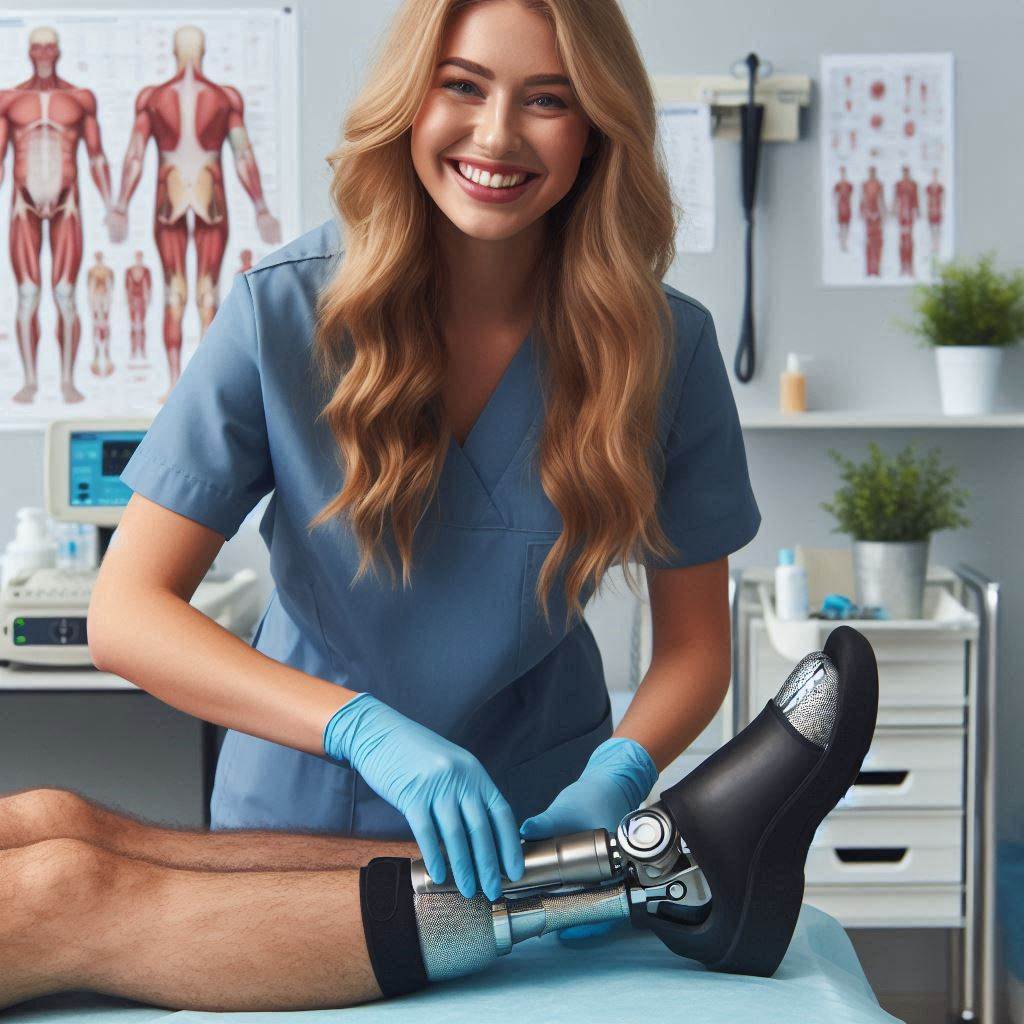Introduction
Orthopedic technologists play a crucial role in assisting orthopedic surgeons with various tasks in a medical setting.
Brief Overview of an Orthopedic Technologist
These professionals help with casting, bracing, assisting in surgery, and providing patient education.
Importance of Patient Care in Orthopedics
Patient care is essential in orthopedics to ensure a successful treatment outcome and overall well-being.
Whether it’s helping patients navigate their recovery process or providing emotional support, orthopedic technologists are at the forefront of patient care.
They play a significant role in ensuring that patients understand their treatment plan and are comfortable throughout their orthopedic journey.
From applying and removing casts to providing information about the healing process, orthopedic technologists are instrumental in patient education.
Their attention to detail, compassion, and communication skills are crucial in building trust and rapport with patients.
In orthopedics, patient care also involves monitoring the patient’s progress, addressing any concerns, and ensuring their overall comfort and safety.
Orthopedic technologists are often the first point of contact for patients, making their role integral in providing quality care and support.
In a field as specialized as orthopedics, patient care goes beyond the technical aspects of the job and encompasses the emotional and psychological well-being of the patient.
Ultimately, orthopedic technologists contribute to the overall patient experience and play a vital role in the success of orthopedic treatments.
Proper Communication with Patients
Effective communication is crucial in the field of orthopedic technology as it helps build trust and confidence with patients.
When interacting with patients, it is essential to use simple language and avoid medical jargon to ensure they understand their condition and treatment options clearly.
Tips for Proper Communication
- Use language that is easy for patients to understand.
- Encourage patients to ask questions and address any concerns they may have.
- Listen actively to patients and provide clear explanations of procedures.
- Avoid interrupting patients when they are speaking and give them your full attention.
- Be patient and empathetic, especially when dealing with patients who may be anxious or in pain.
Importance of Active Listening and Empathy
Active listening is a critical skill that orthopedic technologists must possess to ensure patients feel heard and understood.
Empathy is the ability to put oneself in the patient’s shoes and understand their emotions and concerns.
By practicing active listening and empathy, orthopedic technologists can create a supportive and caring environment for their patients.
Tips for Active Listening and Empathy
- Maintain eye contact and nod to show you are actively listening.
- Paraphrase what the patient has said to ensure you understand correctly.
- Show empathy by acknowledging the patient’s feelings and validating their experiences.
- Use non-verbal cues such as a comforting touch or a reassuring smile to convey empathy.
- Practice patience and compassion in your interactions with patients to demonstrate your genuine concern for their well-being.
Building Trust and Rapport with Patients
Building trust and rapport with patients is essential in orthopedic technology as it fosters a positive relationship and enhances the overall patient experience.
Patients are more likely to follow their treatment plans and adhere to medical advice when they trust their healthcare providers.
By establishing trust and rapport, orthopedic technologists can facilitate better outcomes for their patients.
Tips for Building Trust and Rapport
- Be honest and transparent in your communication with patients.
- Follow through on your commitments and ensure patients feel valued and respected.
- Take the time to get to know your patients and show genuine interest in their well-being.
- Be approachable and accessible to address any concerns or questions patients may have.
- Maintain confidentiality and uphold professional boundaries to build trust and respect with patients.
In a nutshell, proper communication, active listening, empathy, and building trust and rapport are essential skills for orthopedic technologists to provide quality patient care.
By incorporating these tips into their practice, orthopedic technologists can create a positive and supportive environment for their patients, ultimately leading to improved patient outcomes and satisfaction.
Read: Ultrasound Technician vs. Radiologic Technologist
Understanding Patient Needs and Concerns
When working as an orthopedic technologist, it is crucial to understand the needs and concerns of your patients in order to provide them with the best possible care.
Patients who come to a clinic or hospital for orthopedic care are often dealing with pain and limited mobility, which can greatly impact their quality of life.
It is important to listen to their concerns and empathize with their struggles.
Some patients may feel overwhelmed or anxious about their condition and the prospect of undergoing procedures or surgeries.
As an orthopedic technologist, you can help alleviate these fears by providing reassurance and addressing any questions or uncertainties they may have.
Addressing Fears and Anxieties Related to Procedures
One way to address fears and anxieties related to procedures is to explain the process in a clear and concise manner.
Use layman’s terms to ensure that the patient understands what will happen during the procedure and what to expect afterwards.
Additionally, it is important to let patients know that they can ask questions at any time and that their concerns will be taken seriously.
This open communication can help build trust and confidence in the care that you provide.
Educating Patients About Their Condition and Treatment Options
Empowering patients with knowledge about their condition and treatment options is key to helping them make informed decisions about their care.
Take the time to educate patients about their diagnosis, the goals of treatment, and the various options available to them.
Use visual aids, such as diagrams or models, to help patients better understand their condition and the recommended treatments.
Encourage patients to ask questions and engage in discussions about their care plan so that they feel more involved in the decision-making process.
By prioritizing patient education and communication, orthopedic technologists can enhance the overall patient experience and contribute to better outcomes for those under their care.
Read: Benefits of a Career as an Ultrasound Technician
Transform Your Career Today
Unlock a personalized career strategy that drives real results. Get tailored advice and a roadmap designed just for you.
Start NowEnsuring patient comfort during procedures
Ensuring patient comfort during procedures is crucial for orthopedic technologists.
Patients often feel anxious and uncomfortable before and during procedures.
Providing a calm and reassuring environment helps alleviate their anxiety.
Technologists should communicate clearly with patients, explaining each step of the procedure.
This communication helps patients understand what to expect and reduces their fear.
Offering physical comfort is equally important.
Adjusting the room temperature and providing blankets can make patients feel more at ease.
Technologists should always be gentle when handling patients, especially when positioning them or applying devices.
Even small gestures, like offering a pillow for support, can significantly improve patient comfort.
Proper Positioning and Use of Equipment
Proper positioning is vital in orthopedic procedures.
Incorrect positioning can lead to complications and increased discomfort for the patient.
Orthopedic technologists must ensure patients are correctly positioned to facilitate the procedure and promote healing.
This positioning also helps prevent additional injuries or strain.
Using equipment properly is another critical aspect.
Technologists must be skilled in operating and adjusting various orthopedic devices.
They should ensure that devices like splints, braces, and casts are applied securely but comfortably.
Properly fitted devices prevent movement that could hinder healing and reduce patient discomfort.
Regularly checking the fit of these devices is essential.
As swelling changes, the fit of casts and splints may need adjustment.
Technologists should be vigilant in monitoring and making necessary adjustments to maintain patient comfort and safety.
Managing Pain and Discomfort Effectively
Effective pain management is a key responsibility of orthopedic technologists.
Pain can significantly impact a patient’s recovery and overall experience.
Technologists must be attentive to signs of pain and discomfort and take appropriate measures to address them.
Non-pharmacological methods can be highly effective in managing pain.
Techniques such as applying ice packs or using elevation can reduce swelling and alleviate pain.
Teaching patients these methods empowers them to manage their pain at home, promoting faster recovery.
Technologists should also communicate with the healthcare team about the patient’s pain levels.
Ensuring that the patient receives appropriate pain medication and adjustments to their care plan is crucial.
Coordinating with nurses and doctors helps provide comprehensive pain management tailored to each patient‘s needs.
Encouraging patients to express their pain levels openly is important.
Technologists should create an environment where patients feel comfortable discussing their pain.
This open communication allows for timely interventions and adjustments to the treatment plan.
Orthopedic technologists play a vital role in ensuring patient comfort and effective pain management.
By providing a calm environment and clear communication, they help alleviate patient anxiety.
Proper positioning and use of equipment are essential for successful procedures and patient comfort.
Managing pain and discomfort effectively enhances patient recovery and overall experience.
Orthopedic technologists must be attentive, skilled, and compassionate in their approach.
By focusing on these essential patient care tips, they contribute significantly to the success of orthopedic treatments and patient satisfaction.
Read: Work Environment for Surgical Technologists: Hospitals vs. Clinics

Infection control and prevention measures
As an orthopedic technologist, one of your primary responsibilities is to ensure proper infection control and prevention measures are in place to protect both yourself and your patients.
Here are some essential tips to help you maintain a clean and safe environment:
- Always wash your hands thoroughly before and after interacting with a patient. Hand hygiene is crucial in preventing the spread of infections in a clinical setting.
- Use personal protective equipment (PPE) such as gloves, masks, and gowns when necessary. These items are designed to protect you from exposure to potentially harmful pathogens.
- Ensure that all medical instruments and equipment are properly sterilized before use. This includes autoclaving instruments and using disinfectants on surfaces to prevent cross-contamination.
- Follow proper protocols for handling and disposing of biohazardous waste. It is essential to dispose of waste in designated containers to prevent the spread of infections.
Importance of Maintaining a Clean and Sterile Environment
Maintaining a clean and sterile environment in a healthcare setting is crucial for preventing the spread of infections and ensuring the safety of both patients and staff.
Here are some key reasons why cleanliness is essential:
- Reduce the risk of healthcare-associated infections (HAIs): By keeping the environment clean and sterile, you can minimize the risk of HAIs, which can have serious consequences for patients.
- Promote a positive patient experience: A clean and sterile environment can help patients feel more comfortable and confident in the care they are receiving.
- Increase efficiency in patient care: When the environment is clean and organized, it allows for smoother workflows and reduces the risk of disruptions due to infections.
- Maintain professional standards: A clean and sterile environment reflects positively on the professionalism and quality of care provided by the healthcare facility.
Proper Hand Hygiene and Use of Personal Protective Equipment
Proper hand hygiene and the use of personal protective equipment (PPE) are essential practices for orthopedic technologists to prevent the spread of infections. Here are some tips to help you maintain good hand hygiene and use PPE effectively:
- Wash your hands with soap and water for at least 20 seconds before and after patient contact. If soap and water are not available, use hand sanitizer with at least 60% alcohol.
- Properly don and doff gloves to avoid cross-contamination. Change gloves between patients and tasks to prevent the spread of pathogens.
- Wear a mask when interacting with patients who may have respiratory infections to protect yourself and others from airborne particles.
- Use gowns or aprons when performing procedures that may expose you to bodily fluids or other contaminants. Make sure to remove and dispose of them properly after use.
By following these infection control and prevention measures, maintaining a clean and sterile environment, and practicing proper hand hygiene and PPE use, orthopedic technologists can play a crucial role in ensuring patient safety and preventing the spread of infections in healthcare settings.
Remember, infection prevention is everyone’s responsibility, and by taking these steps, you can help create a safer and healthier environment for both patients and healthcare providers.
Read: Preparing for a Sonography Job Interview: Tips
Monitoring Patient Progress and Recovery
An essential aspect of an orthopedic technologist’s role is to closely monitor the progress and recovery of patients undergoing orthopedic treatment.
This involves regularly assessing their range of motion, pain levels, and overall functionality.
By keeping track of these key indicators, orthopedic technologists can identify any improvements or setbacks in a patient’s condition.
This information is critical for adjusting treatment plans and ensuring the best possible outcomes for patients.
Recognizing Signs of Complications or Setbacks
Orthopedic technologists must be vigilant in recognizing any signs of complications or setbacks during a patient’s recovery process.
This could include increased pain, swelling, or limited range of motion.
By being proactive and attentive, orthopedic technologists can address these issues promptly and prevent further complications from arising.
Early intervention is key to ensuring a successful recovery for patients.
Collaborating with the Healthcare Team to Provide Comprehensive Care
Orthopedic technologists play a crucial role in the healthcare team when it comes to providing comprehensive care for patients.
They work closely with orthopedic surgeons, physical therapists, and other healthcare professionals to ensure that patients receive the best possible treatment.
Collaboration is essential for coordinating care, sharing information, and making informed decisions about a patient’s treatment plan.
By working together, healthcare professionals can provide a holistic approach to patient care, leading to better outcomes and a higher quality of life for patients.
Respecting patient confidentiality and privacy
Respecting patient confidentiality and privacy is paramount for orthopedic technologists.
Patients trust healthcare providers with sensitive information about their health.
Technologists must safeguard this information at all times.
They should only discuss patient details with authorized personnel involved in the patient’s care.
Maintaining confidentiality extends to handling patient records and electronic information securely.
Technologists must follow established protocols for data protection and ensure that patient information is kept confidential.
This practice builds trust between patients and healthcare providers and upholds ethical standards.
Importance of Upholding Ethical Standards
Upholding ethical standards is fundamental in healthcare.
Orthopedic technologists must adhere to ethical guidelines set by professional organizations.
These standards govern their conduct, ensuring fairness, integrity, and respect in patient interactions.
Technologists should prioritize patient welfare above all else and act in the patient’s best interests.
Ethical behavior includes honesty in all communications with patients and colleagues.
Technologists should provide accurate information about procedures, risks, and expected outcomes.
They should also respect patient autonomy, involving them in decisions about their care whenever possible.
Maintaining Professionalism at All Times
Maintaining professionalism is essential for orthopedic technologists.
Professionalism encompasses behaviors, attitudes, and appearance that reflect competence and dedication to patient care.
Technologists should approach their work with a positive attitude, demonstrating respect and empathy towards patients and colleagues.
Professionalism also involves effective communication skills.
Technologists should listen actively to patients’ concerns and respond compassionately.
Clear and concise communication helps build trust and ensures patients feel informed and supported throughout their treatment.
In orthopedic settings, teamwork is crucial for delivering comprehensive patient care.
Technologists collaborate with surgeons, nurses, and other healthcare professionals to achieve optimal outcomes for patients.
Professionalism includes respecting colleagues’ expertise and working collaboratively towards shared goals.
Delve into the Subject: Interview Tips for Home Health Aide Job Seekers
Conclusion
In conclusion, patient care is at the heart of orthopedic technologists’ responsibilities.
Throughout this blog post, we’ve explored essential tips for providing exemplary care to orthopedic patients.
Recap of Key Points Discussed in the Blog Post
We’ve emphasized the importance of ensuring patient comfort during procedures, highlighting the role of clear communication and a supportive environment.
Proper positioning and the use of equipment were also highlighted as crucial aspects of patient care, ensuring safety and efficacy in treatment.
Managing pain and discomfort effectively emerged as another critical aspect, promoting faster recovery and overall patient satisfaction.
Respecting patient confidentiality and privacy is paramount, underlining the trust patients place in healthcare providers.
Upholding ethical standards guides technologists’ conduct, ensuring fairness and integrity in all patient interactions.
Maintaining professionalism includes effective communication and collaboration within the healthcare team, ultimately enhancing patient care.
Importance of Patient Care in Enhancing Outcomes for Orthopedic Patients
Patient care plays a pivotal role in enhancing outcomes for orthopedic patients.
By prioritizing patient comfort and safety, technologists contribute to successful treatment outcomes and patient satisfaction.
Effective pain management and ethical conduct foster trust and cooperation between patients and healthcare providers.
The commitment to professionalism ensures that orthopedic technologists deliver comprehensive care, addressing patient needs with compassion and expertise.
Ultimately, patient-centered care promotes healing, recovery, and overall well-being for orthopedic patients.
Transform Your Career Today
Unlock a personalized career strategy that drives real results. Get tailored advice and a roadmap designed just for you.
Start Now[E-Books for Sale]
The Big Book of 500 High-Paying Jobs in America: Unlock Your Earning Potential
$19.99 • 500 High-Paying Jobs • 330 pages
Explore 500 high-paying jobs in America and learn how to boost your career, earn more, and achieve success!
See All 500 High-Paying Jobs of this E-Book
1001 Professions Without a Degree: High-Paying American Jobs You Can Start Now
$19.99 • 1001 Professions Without a Degree • 174 pages
Discover 1001 high-paying jobs without a degree! Unlock career tips, skills, and success strategies for just $19.99!




